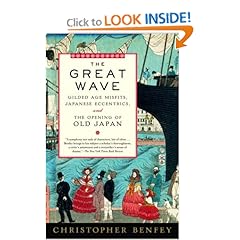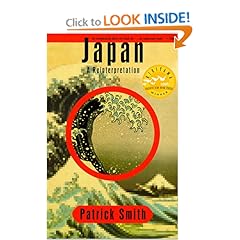Goals for 2009
It’s not too late to with everyone a happy 2009 yet is it?
Happy New Years everyone!
You may have noticed that with the new year came a new design. I’ve worked to redesign the site back into a more “blog” format. Previous I wanted a “website” but the features of that system (drupal) I just never came around to use. So I’m back with word press for awhile until I find something cooler.
To start off the new year I wanted to start with some books I plan on reading this year. All are Asian specific with 3 being Japan specific. I’ve sampled these books and have had them on my list for while, but never got around to reading them or buying them. However on a trip to powell’s book in Portland.. I made an effort, as a gesture to the new years, to pick them up and read them when I can.
The books are as follows:

Learning To Bow By Bruce Feiler. This book NPR reviewed a number of months ago when interviewing one of their contributors: Bruce Feiler. The book is about his stint in the JET Programme as an ALT in Sano, Japan. It’s a hilarious rendition of the trifles and trials of a foreigner learning the hard way of being a member of a community and being a teacher in a foreign place with foreign rules. Mr. Feiler does a great job of blending his personal annotations about teaching in Sano with history about Japan’s education system and certain traditions.
Since I hope to pursue a similar job this year I thought it only prudent that I pick up Mr. Feiler’s book. Having only read to the third chapter this a book that’s a true page turner. I recommend it to anyone who wants to teach in Japan or, for that matter, watched “Lost In Translation” (found it funny) and wants more…

The Great Wave By Christopher Benfey
(True be told I haven’t started this book yet so I’m going to defer for the moment to Booklist’s summary)
From Booklist
For aesthetes dissatisfied with the upholstered world of late Victorian taste, Japan offered a cultural richness that mesmerized an unusual gallery of American characters. Their collecting and publicizing of all things Japanese animates this braided tour of cultural encounter. Of the people Benfey follows, none but Henry Adams is a household name today, and he was a latecomer to the Japanese fad, a languid, solace-seeking (after his wife’s suicide) tourist among Benfey’s group. More distinctive are those who initially sailed to Japan after the Meiji restoration of 1868. Benfey recounts Edward Sylvester Morse’s seminal importance; he went to Japan as an anatomist of mollusks and returned as a popular writer and lecturer on Japanese style, particularly architecture. Others brought back immense quantities of artwork, or, like muralist John La Farge, sought a creative change in Japan’s land- and seascapes. Conveying both rapture and disappointment with Japanese culture, Benfey draws a sophisticated portrait of the period’s personalities. Gilbert Taylor
Copyright © American Library Association.
This book appeared to be pretty interesting when I picked it up. I was looking for a book written somewhere between the early Meiji years and post Perry years so I hope this book will do the trick..

Japan A Reinterpretation By Patrick Smith
(Again I haven’t started this book so I’ll refer to Amazon’s Review First)
Amazon.com Review
For years westerners have viewed Japan as a nation of democratic, hard-working, unabashedly pro-Western people, a viewpoint promulgated mainly by a group of postwar scholars known as the Chrysanthemum Club. Journalist Patrick Smith takes a hard, fresh look at Japan and its relations with the West–particularly the United States–in Japan: A Reinterpretation. Smith asserts that the economic miracle we in the West have long admired was achieved at the expense of true political reform, creating a corporation instead of a democracy. Now that the miracle has collapsed, the Japanese are in a state of cultural, political, and social malaise. Smith approaches Japan from many different directions: first by reinterpreting the country’s postwar history as presented by the Chrysanthemum Club, then by delving into the lives of ordinary Japanese. From the overworked salarymen to the upper echelons of Japanese politicians, Patrick Smith paints a bold new picture of a nation suffering from overdevelopment. In addition, Japan: A Reinterpretation focuses on infrequently examined topics such as Japan’s educators and writers. Though some of Smith’s statements may seem a bit hyperbolic, his book is solidly researched and impeccably presented.
Sometimes Powell’s have recommendations and this was one of them. It appears to be a great that dives into more “good questions to be asked” of a complex society like Japan. I’m a tad wary of books that promulgate some “grand solution” Japan must accept or “some great problem” book, but I’ll give this one a try. Of course, I also bought it for the cool cover…
Finally:

Three Cups of Tea By Greg Mortenson (and David Oliver Relin).
While I haven’t started this book, It’s been one I wanted to read since Graduation 2008 at Lewis and Clark. Author Greg Mortenson was very gracious to speak at our ceremony and it also happened to be where he was awarded his Doctor’s Degree. So Mr. Mortenson, I believe, is a LC Alumni (like me) and during the ceremony gave a moving story of his ordeal in Pakistan and how he turned that into building schools and connecting with the local society.
Ok and this is what Publisher’s Weekly said,
From Publishers Weekly
Starred Review. Some failures lead to phenomenal successes, and this American nurse’s unsuccessful attempt to climb K2, the world’s second tallest mountain, is one of them. Dangerously ill when he finished his climb in 1993, Mortenson was sheltered for seven weeks by the small Pakistani village of Korphe; in return, he promised to build the impoverished town’s first school, a project that grew into the Central Asia Institute, which has since constructed more than 50 schools across rural Pakistan and Afghanistan. Coauthor Relin recounts Mortenson’s efforts in fascinating detail, presenting compelling portraits of the village elders, con artists, philanthropists, mujahideen, Taliban officials, ambitious school girls and upright Muslims Mortenson met along the way. As the book moves into the post-9/11 world, Mortenson and Relin argue that the United States must fight Islamic extremism in the region through collaborative efforts to alleviate poverty and improve access to education, especially for girls. Captivating and suspenseful, with engrossing accounts of both hostilities and unlikely friendships, this book will win many readers’ hearts. (Mar.)
And that wraps up 2009’s books I want to read sometime this year.
Thanks,
~Josh The R3dragon